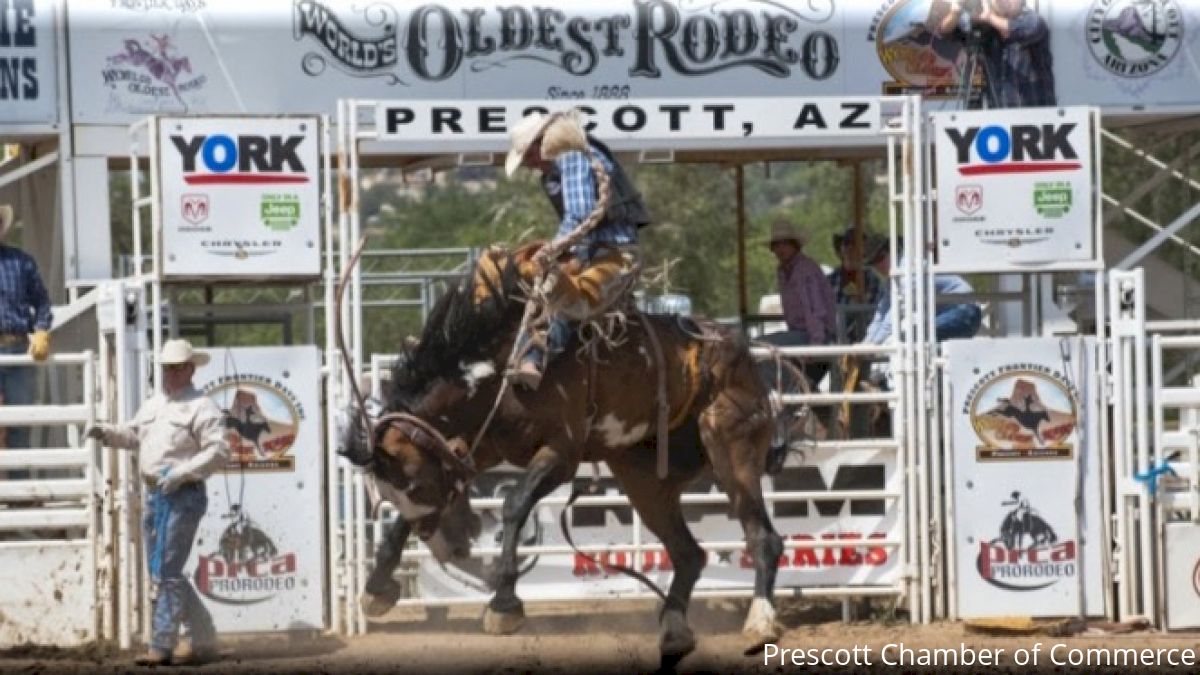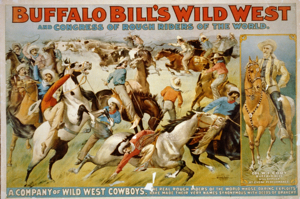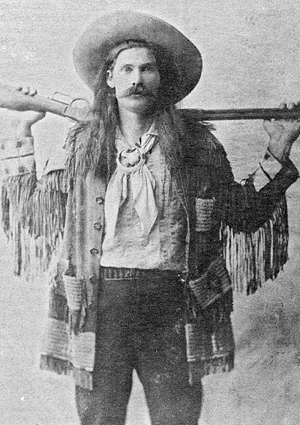Ages Old Question: Who Can Claim World's Oldest Rodeo?
Ages Old Question: Who Can Claim World's Oldest Rodeo?
What is the world's oldest rodeo? Hard to say as nearly a half-dozen events are laying claim to ownership of America's greatest frontier bragging right.

On the surface it seems like a straightforward question.
What is the world's oldest rodeo?
Believe it or not, the answer depends on who you talk to as there are nearly a half-dozen events laying claim to ownership of perhaps America's greatest frontier bragging right.
"An exact date of the first exhibition of the daily work and, later, of the sport of the cowboy cannot be given," the late Clifford P. Westermeier presciently wrote in his 1947 book Man, Beast, Dust: The Story of Rodeo. "If such an attempt were made, it would bring forth vehement and justified protests from the various parts of the West."
Boy, has it ever.
Rodeo is actually not an American creation, in a genuine sense, but has deep European roots. Bull riding can be traced back to the ancient Minoans of Crete, and bull wrestling may have been one of the original Olympic events in Ancient Greece. Rodeo, from the Spanish word rodear meaning "to encircle," makes sense when you consider the mixture of cattle wrangling and bullfighting dates back to 16th Century conquistadors.
The sport of rodeo, as we know it, evolved after the Texas Revolution and the Mexican-American War when Anglo cowboys learned the skills and adopted the dress and vocabulary of Spanish ranchers and their Mexican ranch hands. Contests between ranches proliferated, and bronco riding, bull riding and roping contests became staples at all kinds of festivals.
 It is at that point, in the late 1800s, when the semantic debate over the first "official" rodeo begins.
It is at that point, in the late 1800s, when the semantic debate over the first "official" rodeo begins.
Many historians believe that Buffalo Bill Cody started the Old Glory Blowout, the first competition offering prize money, on July 4, 1882 at an enclosed horse track in North Platte, Nebraska. Burr Murphy was the big winner, grabbing a $50 prize (approximately $1200 today) for roping and then riding a buffalo.
The success of this event prompted Cody to start his Wild West Show and Congress of Rough Riders, events that traveled the worlds and served as precursors to today's professional rodeo.
But are the history books accurate?
Not according to an old edition of the Field and Farm Journal of Denver, which identified the first organized competition of cowboys for prizes having occurred on July 4, 1869, in Deer Trail, Colorado. Colorado House Joint Resolution No. 1025, with the Senate and House of Representatives concurring, affirms that "the first rodeo held in the world" was held in Deer Trail.
That year, Emilnie Gardenshire of England rode a Hashknife horse named Montana Blizzard to victory, earning the title Champion Bronc Buster of the Plains and some new clothes, donated by a Denver dry goods store.
But was he America's first champion cowboy?
Not according to World's Work magazine, which anointed A.T. (Trav) Windham as "one of the greatest cowmen Texas ever knew," after he roped and tied his steer in 22 seconds at the Pecos rodeo on July 4, 1883. That West Texas event, which saw calves herded to the Reeves County Courthouse and then chased down the main street by cowboys with ropes, boasts being the world's first in-town rodeo.
But does that distinction make West of the Pecos Rodeo "Home of the World's First Rodeo," as it boasts on its Facebook page?
You'll get a vehement argument from the 15,000 residents of Payson, Arizona, whose pride and joy is its rodeo which began in August 1884 and is billed as the "World's Oldest Continuing Rodeo."
 Payson's rodeo, now the PRCA ProRodeo, began as a friendly competition between local cowboys and ranchers, who would round up cattle roaming free in the onto Basin in a central camp for branding and ride anything the one's that would buck. Charlie Meadows beat Tom Horn in a steer roping competition at the first Payson rodeo, winning a trophy and a cash prize.
Payson's rodeo, now the PRCA ProRodeo, began as a friendly competition between local cowboys and ranchers, who would round up cattle roaming free in the onto Basin in a central camp for branding and ride anything the one's that would buck. Charlie Meadows beat Tom Horn in a steer roping competition at the first Payson rodeo, winning a trophy and a cash prize.
Surely the longest continuous rodeo must be the oldest, right?
Not according to the 1985 book American Rodeo From Buffalo Bill to Big Business, which cited a July 4, 1888 event in Prescott, Arizona as meeting five stringent criteria vital to claiming to be "the first formalized rodeo." Prescott had a committee to plan and stage the rodeo, they invited cowboys to compete, they were the first to charge admission, they awarded prizes, and they documented the results of all the contests. Juan Levias of Date Creek Ranch tied Meadows in bronc riding and won steer roping. Levias was awarded cash and an inscribed silver trophy as Best Cowboy of the tournament, which is still displayed at Prescott's Sharlot Hall Museum.
As if that trophy weren't proof enough, consider that since August 6, 1985 the U.S. Patent Office has recognized Prescott Frontier Days (registered service mark number 1,353,477) as the first "cowboy tournament" of its time.
End of story? Not exactly.
In 1985, a quiz card included in the popular board game Trivial Pursuit posed the question "What rough-and-tumble Western sport was first formalized in Prescott, Ariz." The answer, rodeo, fired up the folks in Pecos who threatened to sue Hasbro, the game's maker, if the card wasn't changed. Prescott then threatened to countersue if the card was changed.
Ultimately, Hasbro's lawyers successfully argued that inclusion of the quantifier "formalized" meant the question was accurately written. Adding insult to injury, Pecos was later dropped from all mention in Encyclopedia Britannica's entry on rodeo's origin.
While the encyclopedia now recognizes Prescott as having "held the first annual rodeo" in its online edition, that hasn't squelched the debate.
There are 1872 newspaper accounts of the first post-Civil War cowboy contests being held in Cheyenne, and the Cheyenne Frontier Days Rodeo, held in Wyoming's capital since 1897, has trademarked the name The Daddy of 'em All.
Additionally, the 1994 book The American West, cites the Colorado State Fair in 1876 as having featured a race between a cowboy and a horse, and the 101 Ranch in Winfield, Kansas as holding a cowboy exhibition in 1882.
All of this begs the question, why have all of these cities invested more than a century trying to win what is clearly an unsolvable argument?
"So much of the world is so mundane now,'' David Stout, former secretary-treasurer for the Rodeo Cowboys Association, told The New York Times in 1989. "'The truth is, the guys on the end of a cattle drive swallowing all that dust at the end of the herd wished they were somewhere else. But people want something with a little romance they can associate with, and that's what rodeo still has to offer."
What is the world's oldest rodeo?
Believe it or not, the answer depends on who you talk to as there are nearly a half-dozen events laying claim to ownership of perhaps America's greatest frontier bragging right.
"An exact date of the first exhibition of the daily work and, later, of the sport of the cowboy cannot be given," the late Clifford P. Westermeier presciently wrote in his 1947 book Man, Beast, Dust: The Story of Rodeo. "If such an attempt were made, it would bring forth vehement and justified protests from the various parts of the West."
Boy, has it ever.
Rodeo is actually not an American creation, in a genuine sense, but has deep European roots. Bull riding can be traced back to the ancient Minoans of Crete, and bull wrestling may have been one of the original Olympic events in Ancient Greece. Rodeo, from the Spanish word rodear meaning "to encircle," makes sense when you consider the mixture of cattle wrangling and bullfighting dates back to 16th Century conquistadors.
The sport of rodeo, as we know it, evolved after the Texas Revolution and the Mexican-American War when Anglo cowboys learned the skills and adopted the dress and vocabulary of Spanish ranchers and their Mexican ranch hands. Contests between ranches proliferated, and bronco riding, bull riding and roping contests became staples at all kinds of festivals.
 It is at that point, in the late 1800s, when the semantic debate over the first "official" rodeo begins.
It is at that point, in the late 1800s, when the semantic debate over the first "official" rodeo begins.Many historians believe that Buffalo Bill Cody started the Old Glory Blowout, the first competition offering prize money, on July 4, 1882 at an enclosed horse track in North Platte, Nebraska. Burr Murphy was the big winner, grabbing a $50 prize (approximately $1200 today) for roping and then riding a buffalo.
The success of this event prompted Cody to start his Wild West Show and Congress of Rough Riders, events that traveled the worlds and served as precursors to today's professional rodeo.
But are the history books accurate?
Not according to an old edition of the Field and Farm Journal of Denver, which identified the first organized competition of cowboys for prizes having occurred on July 4, 1869, in Deer Trail, Colorado. Colorado House Joint Resolution No. 1025, with the Senate and House of Representatives concurring, affirms that "the first rodeo held in the world" was held in Deer Trail.
That year, Emilnie Gardenshire of England rode a Hashknife horse named Montana Blizzard to victory, earning the title Champion Bronc Buster of the Plains and some new clothes, donated by a Denver dry goods store.
But was he America's first champion cowboy?
Not according to World's Work magazine, which anointed A.T. (Trav) Windham as "one of the greatest cowmen Texas ever knew," after he roped and tied his steer in 22 seconds at the Pecos rodeo on July 4, 1883. That West Texas event, which saw calves herded to the Reeves County Courthouse and then chased down the main street by cowboys with ropes, boasts being the world's first in-town rodeo.
But does that distinction make West of the Pecos Rodeo "Home of the World's First Rodeo," as it boasts on its Facebook page?
You'll get a vehement argument from the 15,000 residents of Payson, Arizona, whose pride and joy is its rodeo which began in August 1884 and is billed as the "World's Oldest Continuing Rodeo."
 Payson's rodeo, now the PRCA ProRodeo, began as a friendly competition between local cowboys and ranchers, who would round up cattle roaming free in the onto Basin in a central camp for branding and ride anything the one's that would buck. Charlie Meadows beat Tom Horn in a steer roping competition at the first Payson rodeo, winning a trophy and a cash prize.
Payson's rodeo, now the PRCA ProRodeo, began as a friendly competition between local cowboys and ranchers, who would round up cattle roaming free in the onto Basin in a central camp for branding and ride anything the one's that would buck. Charlie Meadows beat Tom Horn in a steer roping competition at the first Payson rodeo, winning a trophy and a cash prize.Surely the longest continuous rodeo must be the oldest, right?
Not according to the 1985 book American Rodeo From Buffalo Bill to Big Business, which cited a July 4, 1888 event in Prescott, Arizona as meeting five stringent criteria vital to claiming to be "the first formalized rodeo." Prescott had a committee to plan and stage the rodeo, they invited cowboys to compete, they were the first to charge admission, they awarded prizes, and they documented the results of all the contests. Juan Levias of Date Creek Ranch tied Meadows in bronc riding and won steer roping. Levias was awarded cash and an inscribed silver trophy as Best Cowboy of the tournament, which is still displayed at Prescott's Sharlot Hall Museum.
As if that trophy weren't proof enough, consider that since August 6, 1985 the U.S. Patent Office has recognized Prescott Frontier Days (registered service mark number 1,353,477) as the first "cowboy tournament" of its time.
End of story? Not exactly.
In 1985, a quiz card included in the popular board game Trivial Pursuit posed the question "What rough-and-tumble Western sport was first formalized in Prescott, Ariz." The answer, rodeo, fired up the folks in Pecos who threatened to sue Hasbro, the game's maker, if the card wasn't changed. Prescott then threatened to countersue if the card was changed.
Ultimately, Hasbro's lawyers successfully argued that inclusion of the quantifier "formalized" meant the question was accurately written. Adding insult to injury, Pecos was later dropped from all mention in Encyclopedia Britannica's entry on rodeo's origin.
While the encyclopedia now recognizes Prescott as having "held the first annual rodeo" in its online edition, that hasn't squelched the debate.
There are 1872 newspaper accounts of the first post-Civil War cowboy contests being held in Cheyenne, and the Cheyenne Frontier Days Rodeo, held in Wyoming's capital since 1897, has trademarked the name The Daddy of 'em All.
Additionally, the 1994 book The American West, cites the Colorado State Fair in 1876 as having featured a race between a cowboy and a horse, and the 101 Ranch in Winfield, Kansas as holding a cowboy exhibition in 1882.
All of this begs the question, why have all of these cities invested more than a century trying to win what is clearly an unsolvable argument?
"So much of the world is so mundane now,'' David Stout, former secretary-treasurer for the Rodeo Cowboys Association, told The New York Times in 1989. "'The truth is, the guys on the end of a cattle drive swallowing all that dust at the end of the herd wished they were somewhere else. But people want something with a little romance they can associate with, and that's what rodeo still has to offer."